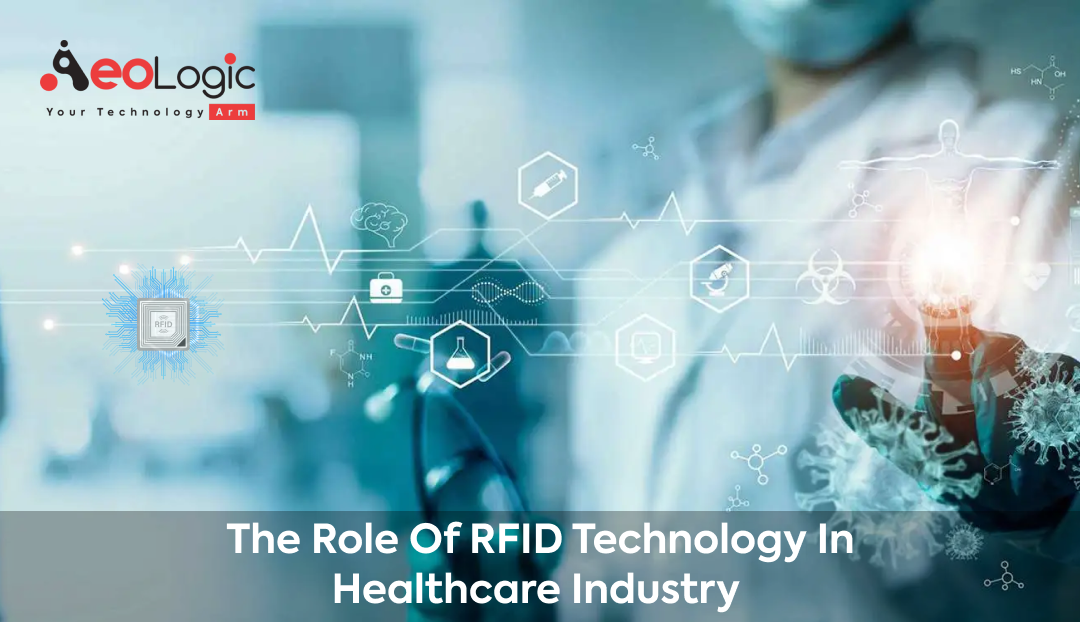Radio-frequency identification (RFID) technology is redefining the healthcare industry. This innovative technology provides an innovative approach to tracking and managing assets and patients. The integration of RFID technology into the healthcare industry will help this industry move up above and beyond. This technology helps in enhancing operations and improving patient outcomes.
The RFID in Healthcare Market Size is valued at 5.51 Billion in 2022 and is predicted to reach 20.28 Billion by the year 2031 at a 15.75 % CAGR during the forecast period for 2023-2031.
Let’s look at the transformative role of RFID technology in the healthcare industry. Here, you will read how it’s shaping the future of healthcare ops and patient care. Let’s read below about the potential of RFID to make healthcare services more efficient, accurate, and patient-centric.
Understanding RFID Technology
Radio Frequency Identification (RFID) is a form of wireless communication that utilizes radio waves to identify and track objects, animals, or people. There are two main components of RFID: RFID tags and RFID readers. The tags can be attached to or embedded in objects and individuals. It contains electronically stored information. The readers send out radio waves that communicate with the tags. It allows the retrieval the stored information without needing a direct line of sight.
Yes, Barcode is good for tracking but RFID is best. RFID technology has many advantages. It can read multiple tags at once and store more data than a barcode. Also, RFID tags can be read from several meters away. It can pass through various materials. So, RFID tags are highly versatile for different applications in healthcare industry.
The components of an RFID system include:
RFID has a wide range of applications in healthcare that improve operational efficiency and patient outcomes. Let us look at the components of the RFID system:
- There are two types of RFID tags in it: passive and active. Passive tags rely on the reader for power, but active tags have their own power supply. It permits active tags to send signals across longer distances.
- RFID readers use radio waves to communicate with tags. When a tag enters the reader’s electromagnetic field, it detects radio waves and sends information back to the reader.
- Antennas provide the transmission of radio waves between the reader and the tag.
- RFID Software interprets the data transmitted by the tags and integrates it into a system that can be used for tracking and managing assets, patients, or materials.
Also read: The Role of Information Technology in Healthcare
The Role of RFID Technology in Healthcare
RFID technology’s adoption in healthcare helps in making healthcare delivery systems more efficient and safer. Let’s have a look at the role of RFID in Healthcare Industry –
Monitoring Patients and Their Security: One of the key uses of RFID in health services is for identifying and tracking patients. Through handing out RFID equipped wristbands to patients, medical personnel can promptly access health records, locate a patient within the hospital facility, and keep an eye on patients’ movements as well.
Keeping an Eye on Assets and Devices: We’re aware that hospitals and healthcare establishments face difficulties in locating, determining the status, and availability of essential devices. In this scenario, RFID tech performs a crucial role in handling health equipment and resources.
Helps in Monitoring Medication: In health services, ensuring patients are administered with the right medication at appropriate timing holds immense significance. RFID tags on medication packages allow for automated tracking and inventory management, reducing errors in dispensing medications and enhancing patient safety.
Enhances Data Accuracy and Patient Care: RFID technology helps in the automatic capture of data. It minimizes manual entry errors. Thus it ensures that patient records are accurate and up-to-date. This accuracy is important for effective treatment planning and analysis.
Challenges and Considerations of RFID Technology in Healthcare
While RFID technology offers significant benefits to the healthcare sector, its implementation comes with its own set of challenges and considerations. Addressing these concerns is crucial for ensuring the successful adoption and optimization of RFID systems within healthcare facilities.
Implementation Cost
One of the primary barriers to widespread RFID adoption in healthcare is the cost associated with implementing and maintaining an RFID system. The expenses include purchasing hardware (tags and readers), software integration, and training staff. For many healthcare facilities, particularly smaller ones, these upfront costs can be prohibitive.
Technical Challenges
RFID technology must seamlessly integrate with existing healthcare information systems to be truly effective. This integration can be complex and requires careful planning and execution. Additionally, RFID systems can be susceptible to interference from metal objects and liquids, which are abundant in healthcare settings, potentially affecting system reliability.
Patient and Staff Acceptance
The successful implementation of RFID technology also depends on the acceptance and cooperation of both healthcare staff and patients. Training staff to use RFID systems effectively and addressing any concerns patients may have about privacy and safety are essential steps in ensuring the technology’s acceptance.
Regulatory Compliance
Healthcare providers must navigate a complex landscape of regulations governing the use of technology and the protection of patient information. Ensuring that RFID systems comply with healthcare regulations is crucial for legal and ethical operations.
Also Read: Improving Patient Care with RFID Technology in Healthcare
The Future of RFID Technology in Healthcare
As we look ahead, the future of RFID technology in healthcare is poised for significant evolution and growth. The integration of RFID with emerging technologies promises to further enhance healthcare delivery and patient care in ways we are just beginning to imagine. Here are a few predictions and trends shaping the future of RFID in healthcare:
Integration with the Internet of Things (IoT)
The convergence of RFID technology with IoT devices in healthcare is set to offer more comprehensive and interconnected solutions for patient monitoring, asset tracking, and data collection. This integration can lead to smarter healthcare environments where real-time data from various sources is analyzed and used to inform decisions, improve patient outcomes, and optimize operations.
Advanced Patient Care and Remote Monitoring
RFID technology, combined with wearable devices and sensors, will enable advanced patient care and remote monitoring capabilities. Patients with chronic conditions can be monitored in real-time, allowing healthcare providers to respond to changes in patients’ health status promptly. This not only enhances patient care but also reduces the need for hospital readmissions.
Enhanced Supply Chain Management
RFID technology will continue to play a crucial role in streamlining healthcare supply chains, ensuring that medical supplies are efficiently managed and tracked from manufacture to delivery. This will reduce wastage, improve inventory management, and ensure the availability of critical medical supplies when needed.
Improved Security and Privacy Measures
As RFID technology becomes more prevalent in healthcare, so will the focus on enhancing security and privacy measures. Advances in encryption and authentication technologies will ensure that patient data stored on RFID tags is protected against unauthorized access, addressing one of the key concerns associated with RFID implementation.
Collaboration and Standardization
The future will likely see increased collaboration between technology providers, healthcare institutions, and regulatory bodies to develop standardized protocols for RFID technology in healthcare. Standardization will ensure compatibility, interoperability, and security across different systems and devices, facilitating broader adoption and integration.
Also Read: The Impact of Mobile Apps on Patient Engagement in Healthcare
Final Words
Throughout this article, we’ve journeyed through the transformative role of RFID technology in healthcare, from understanding its basic mechanics to exploring its vast applications and envisioning its future. RFID technology is not just a tool for efficiency and safety; it’s a gateway to a new era of healthcare innovation. We’ve learned:
The journey of RFID technology in healthcare is far from over; it’s a burgeoning field ripe with opportunities for innovation, improvement, and exploration. Embracing these technologies today will shape the healthcare landscapes of tomorrow.

I’m Deepika Pandey, an SEO strategist and content writer with 6+ years of experience. I create SEO-friendly content that drives traffic and engages readers. I combine data insights with creativity to help businesses grow their online presence effectively.






